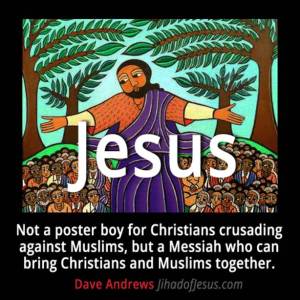
Do we see? It makes all the difference to how we understand troublesome verses like those in our Gospel reading today, as well as similarly perplexing and trouble-provoking verses in the Qu’ran. Do we read sacred scriptures with fear, or with eyes and hearts of compassion? If it is with fear, we will read them out of context and be tempted to misapply them, as fundamentalists do. If it is with eyes and hearts of compassion, we will place them in their true context of God’s love for us all, and we will use them in that deeper spirit and meaning.
Let’s face it, taken out of context, Jesus’ words in today’s Gospel can come across as quite shocking, can’t they?! ‘I came to bring fire to the earth, and how I wish it were already kindled!’ he says. Indeed, you think that I have come to bring peace to the earth? No, I tell you, but rather division!’ Then he goes on to speak of all kinds of divisions within households and families. Is this ‘good news’? Doesn’t it sound a great deal like the kind of language fundamentalist groups of all kinds and other extremists use? Well, yes, it does – if, that is, we read and use them out of context. The reality is that these words of Jesus make no sense – and they can be positively destructive - unless they are placed within the context of Jesus’ own struggle, or ‘jihad’, for God’s truth, justice and compassion.
Today’s Gospel reading, like the other two bible readings we hear today, is about the down to earth realities of God’s love and discipleship in our world. For the Bible is not a work of wishful thinking. The writers of the book of Isaiah, the letter to the Hebrews, and the Gospel of Luke are quite clear that God’s love and compassion will triumph: in the end, and of course eternally, despite all obstacles and any appearances to the contrary. Yet they warn us that such faith will not be an easy journey. The path of discipleship is not always strewn with roses. It never has been and never will be, in this world. Rather it may bring challenges, hardships, conflicts and divisions, and even terrible deaths and destruction. This – let us be absolutely clear – is not God’s will, in the sense of God’s decision or punishment. This is simply what happens when God’s compassion runs up against resistance. We can be assured however that this compassion will ultimately triumph. For this is the nature of the love we see above all in Jesus: that eternal love which can never be defeated, even by the powers of death.
Jesus’ words in today’s Gospel therefore sit rightly alongside those of Isaiah and the letter to the Hebrews. They come out of a time when Jesus was facing increasing opposition to his message of God’s compassion for everyone. They come out of a time when Jesus was turning his mind towards the human conflicts which would end in his death. They come out of a time when Jesus needed to warn his followers that sharing his baptism, his way of life, meant encountering opposition, even from within their own families. Such a struggle, such a ‘jihad’ for compassion, is hardly the be-all or end-all of following Jesus. Peace and joy are eternal promises and we can taste them now in the midst of our struggles. Yet these cannot be avoided.
Today’s readings speak well into our own times, not least to the situation of the persecuted Church across the world. As we reflect upon them, let us therefore be reminded how these verses are so tragically alive in the deaths and destruction of so many people today: people who, like those mentioned in the letter to the Hebrews, suffer for their faithfulness to the way of God, the way of eternal compassion. At the Languages and Cultures Festival today, we will remember such people and we will invite children to share messages of encouragement on cards which we will then send to our suffering and struggling Christian brothers and sisters in the Middle East and in Nepal. For our bible readings today are designed to encourage us in the face of such struggle and to help us encourage one another in God’s true ‘jihad’ of nonviolent love.
Jesus talked about how we human beings love to talk about, anticipate and understand weather changes, but how we fail to do the same with social, political and other changes. He was saying that when we see, or experience, division and destruction, we are typically quick to be fearful, despairing and reactive. Instead, like the letter to the Hebrews, Jesus was seeking to encourage us to take heart in the midst of our trials: for this is but a part of the struggle of God’s compassion becoming real in our world. Will we therefore take heart and share in it? I commend to our reflections and actions these passages, and the continuing faithful witness of the persecuted Church in the face of their trials. Will we also continue to take up the ‘jihad of Jesus’ and the ‘sacred nonviolent struggle’ of God’s enduring compassion? For Jesus said “I came to bring fire to the earth’. As John Wesley and others have said, this fire is the fire of love, not the fire of fundamentalist fear or extremist violence. It is the fire of the persecuted Church which can never be put out. It is the fire of pure love, which transforms even in the worst of all situations. It is the fire of God’s own heart, which is healing and compassion.
In the name of Jesus, who struggled and conquered with love, and in the power of that fire of the Holy Spirit open to us all. Amen.
Jo Inkpin, for Pentecost 13 Year C, Sunday 14 August 2016
 RSS Feed
RSS Feed